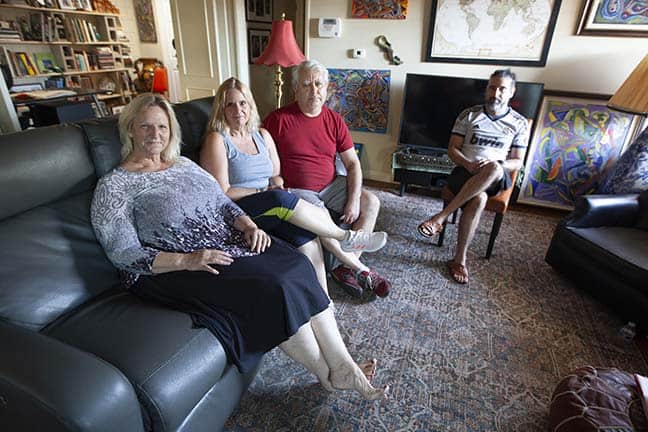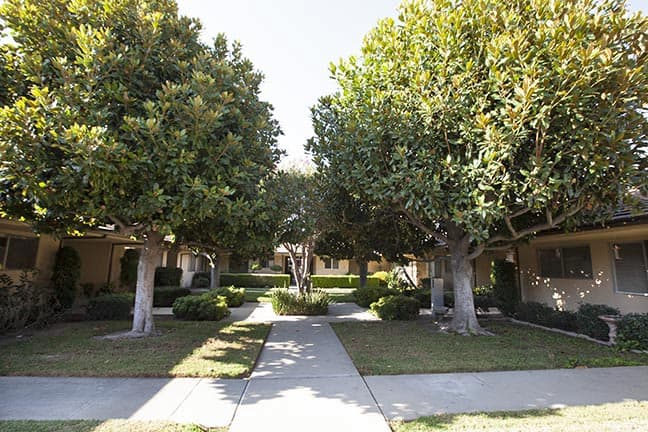Longtime tenants blindsided by threat of mass evictions

Claremont residents Pamela Lee, Christine Alfaro, her husband Octavio Alfaro and Jose Ochoa and dozens of their neighbors who rent apartments at Monarch Terrace are being pressured to leave their homes but the new owner Revere Investments. The owners have offered tenants $7,000 plus the return of the security deposit to leave in the next two months. If people refuse then Revere will begin the eviction process in January after covid related restrictions expire. COURIER photo/Steven Felschundneff
by Steven Felschundneff | steven@claremont-courier.com
Claremont resident Pamela Lee had just returned from vacation late last month when she was shocked to learn that her landlord wanted her to move and was offering a cash payment if she agreed to vacate in the next two months.
“Why would I do that? My friends are here,” Lee said during a recent afternoon at her comfortable three-bedroom, two-bath apartment at Monarch Terrace in the 500 block of Bucknell Drive.
As she started talking with neighbors, it seemed like everyone had received the same message either through a phone call or from running into the onsite property manager Larissa Andrade while walking around the complex. In total, about 30 residents have been offered the buyout.
“The owners are offering buyouts to any resident interested in moving the next 30-60 days they are offering $7,000 plus security deposit,” Andrade wrote in a text message to one tenant.
That text was the rare exception. Most communication so far, including the buyout offers, have been verbal. Tenants have been told if they decline the buyout, the landlord will begin the eviction process after the remaining Covid-era tenant protections expire in December.
Residents describe Monarch Terrace as a very close community, where neighbors regard each other as family. During a recent gathering at Lee’s apartment, several people described feeling bullied by the current owner as well as alarmed by the prospect of looking for a new place to live in the overheated rental market.

Monarch Terrace apartments, built in the 1960s, features large mostly three-bedroom units that all open onto a shared courtyard. Many of the residents have lived there for years, but a new owner wants them out so the units can be refurbished and the rent increased significantly. COURIER photo/Steven Felschundneff
Christine Alfaro and her husband Octavio moved to Monarch Terrace in 2017 because the unit was the same price as their apartment in Upland, but much larger. Their unit’s third bedroom has become a huge benefit, providing a place for their two grandchildren to stay.
The couple said they could stretch finances to pay $2,500 in rent but there are no three-bedroom apartments in Claremont for that price. The couple’s chief concern involves Christine’s mother, who moved to the complex two years ago. The arrangement allows them to care for her mother and provides her with some independence, a luxury that would be lost if they all had to move.
“We love it here,” said Octavio, who grew up in Upland. “We do everything in Claremont, this is now our home.”
According to documents provided by local real estate broker Geoff Hamill, the 38-unit complex had been owned for several decades by Joseph E. Davis, III, who recently died. His heirs sold the property in April 2021 for $12 million, which is secured by a roughly $10 million loan. The new owner is listed as a limited liability corporation, but the property appears on the website of Revere Investments as one of its current holdings.
Mark Chalfin and David Jankowski, principals at Revere, both have more than 25 years of experience in commercial real estate. Jankowski received a bachelor’s degree in economics from Pomona College, according to his bio on the Revere website.
The company’s criteria for new acquisitions includes Southern California properties built after 1940 that are larger than ten units. They prefer not to buy in rent-controlled areas.
They are looking for value added properties, “that offer investors the opportunity to increase an asset’s cash flow through renovations, rebranding, or operational efficiencies.” Increasing an asset’s cash flow, of course, translates to charging more for rent. Revere profits by making housing more expensive.
That may have been what attracted the investment firm to Monarch Terrace. Many of the residents have lived there for years, some for decades, and are paying far less than market rates for Claremont — particularly given the sharp increase in median rents over the last few years.
A remodeled three-bedroom two-bath, 1,500-square-foot unit in Monarch Terrace is currently listed for rent on Zillow at $3,595, double the amount that some current residents are paying. Described as a “spacious, single story, garden style apartment community,” the unit is the largest and most expensive apartment currently listed in Claremont, rivaling the rental rate for some houses. For comparison, a four-bedroom, two-bath 2,300-square-foot single family home on Tenth Street is available for $3,800 per month.
Offering people money to vacate their homes, a practice euphemistically referred to as “cash for keys,” is not illegal, but some housing affordability activists would like to see the practice banned or at least severely regulated. A “tenant’s bill of rights” crafted by a coalition of housing reform organizations called Keep LA Housed, listed curtailing cash for keys as one of those rights. The group has submitted a proposal to the Los Angeles Board of Supervisors with the goal of seeing it become law.
The Tenant Protection Act of 2019, assembly bill 1482, was crafted to protect people like Lee and the Alfaros. It established restrictions on evictions in cases where the tenant has done nothing to warrant being removed, but the landlord wants them out anyway. For a company like Revere, most of the exceptions to the “no fault” eviction mandatedon’t apply. For instance, it’s highly unlikely Chalfin or Jankowski plan to move a direct family member into Monarch Terrace.
Corporate landlords zero in on the law’s loophole that allow for an eviction if the owner plans to perform a major renovation that requires building permits and would cause 30-days of displacement for the tenant. The practice of removing people to fix up an apartment and jack up the rent is fairly new, but it already has a nickname: “renoviction.”
The Tenant Protection Act also capped yearly rent increases at 5% plus the nominal rate of inflation up to a maximum of 10%, which means it would take years for the current tenants at Monarch Terrace to reach market rate.
Lydia Hernandez has lived at Monarch Terrace with her husband Octavio and their three children for more than 20 years. She has decided lobbying the city council to pass a local rent stabilization ordinance is the best way forward to keep her apartment.
“As a tight-knit community, we are working together to look for a solution before we become unhoused,” Hernandez said. “We need to close this loophole like other cities have.”
Councilmember Jennifer Stark confirmed she had spoken with Hernandez about the need for local legislation to close the renovation loophole. She said it’s still too early to talk specifics, but she welcomes investigating the possibilities.
“If there is a way we can protect our renters,” Stark said. “I am motivated to learn more about what we can do.”
The city of Pomona recently enacted an emergency rent stabilization ordinance, which set a low statutory cap on rent increases, but does not address the renovation eviction loophole, according to a staff report.
The COURIER reached out to the principals at Revere but had received no response as of press time.
For the time being, the tenants are resolved to stick together and hope to stay in their apartments, even though some have a less than rosy outlook about their chances.
“Eventually we’ll have no legs to stand on,” Lee said “This is a corporation, they just see the numbers. These people just want to make money.”
Courier photo/Steven Felschundneff









0 Comments